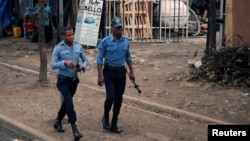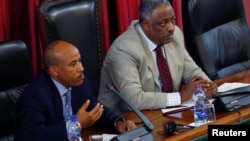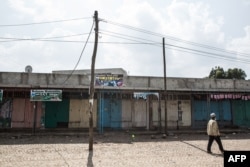Ethiopia's defense minister announced the arrests of the "main instigators" linked to anti-government protests roiling the country, insisting that armed federal patrols were trying to minimize violence. At least a handful of civilian deaths have been reported over the last several days.
"If these people were not arrested, imagine how much destruction would happen," Siraj Fergessa said at a Wednesday news briefing in Addis Ababa.
His comments came hours before U.S. Secretary of State Rex Tillerson's Wednesday evening arrival in the capital city, the first stop on a weeklong tour of five sub-Saharan African nations. The trip is intended to promote counterterrorism, peace, trade and investment, along with good governance.
Fergessa, who insisted Ethiopia's government would uphold the rule of law, did not disclose the number of arrests nor any names. He said only that it was less than during a state of emergency from October 2016 to August 2017. The government reported making roughly 16,000 arrests then; organizations such as Human Rights Watch put the number at "tens of thousands."
This week, a youth group called Qeerroo led a three-day boycott in the Horn of Africa country's vast Oromia region, blocking roads and asking businesses to temporarily close as it pressed for the release of all political prisoners. The boycott, which spread from Addis Ababa to other cities, ended Wednesday.
Emergency decree
Ethiopia has operated under a national state of emergency since Feb. 16, the day after the surprise resignation of Prime Minister Hailemariam Desalegn. The Parliament approved the emergency decree Friday, setting off a fresh wave of protests.
At least six civilians have been killed by security forces since then, based on eyewitness and other expert accounts reported to VOA. Federal and regional officials in Ethiopia did not respond to VOA's repeated requests for verification or comment.
Fergessa, who also heads the Command Post implementing the emergency decree, did not comment on the number of civilian fatalities. But he did not deny that some deaths had occurred, saying "unfortunate encounters happen here and there."
Killed at home
One of the alleged victims was Digafe Dendena, a 65-year-old father of 10 killed Saturday morning at his home in the town of Guder. Relatives told VOA that at least five security troops had followed an adult son to the family home around 7 a.m., accusing him of blocking a road into the neighborhood. The troops roused Dendena from his bed and ordered him to clear stones from the road. When the elder man refused, he was shot dead, the relatives said.
His son, who confronted a security trooper while trying to protect his father, reportedly was hospitalized with wounds to his head and an arm.
The slain man's wife, Kenatu Gurmessa, told VOA: "These things happened in front of me, in my house. My husband has been killed and my son is injured. Our country is imploding. I pray to God to calm things down and bring peace. That's the only thing I can do."
A shopkeeper in Oromia's Mieso district also alleged government aggression during the state of emergency.
"Federal forces are breaking into shops in the absence of owners and looting the materials they want," he told VOA in a phone interview Tuesday, asking to remain anonymous out of fear of reprisal.
The shopkeeper accused federal and regional security forces of excessive violence. "They are firing live bullets at the people," he said.
Nurzema Gale, administrator for Omonado Hospital in the western Oromia town of Jimma, told VOA Wednesday that it had treated three young men for gunshot wounds. They purportedly had been shot by security forces.
"There is bloodshed in Oromia. They barge into homes," Mulatu Gamachu, deputy chairman of the opposition party Oromo Federalist Congress, said of the troops. "These were unjust killings."
Fergessa, the defense minister, said protesters had attacked security forces with everything from knives and machetes to hand grenades, injuring 17 troops. He did not specify when or where any such incidents took place.
New prime minister expected
On Wednesday, the country's ruling coalition – the Ethiopian People's Revolutionary Democratic Front (EPRDF) – announced that its executive committee would meet Sunday to choose a new chairman. In subsequent days, that person automatically would be presented to Parliament for approval as prime minister.
The country of 105 million has experienced spasms of unrest since late 2015 over ethnically based political divisions. Reuters news service reports the next leader is likely to come from the Oromo ethnic group, the country's largest, in a bid to ease tensions.
On Tuesday, before setting out on his Africa trip, Tillerson announced that the United States would contribute more than $110 million in new funding for humanitarian assistance in Ethiopia, where the violence has contributed to food and water shortages.
VOA Horn of Africa Service's Tsion Girma and Jalene Gemeda contributed to this report.






